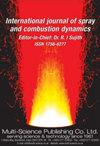Thermoacoustic stabilization of combustors with gradient-augmented Bayesian optimization and adjoint models
IF 2.1
4区 工程技术
Q3 ENGINEERING, MECHANICAL
International Journal of Spray and Combustion Dynamics
Pub Date : 2022-06-23
DOI:10.1177/17568277221109118
引用次数: 0
Abstract
Bayesian optimization (BO) is a global optimization algorithm well-suited for multimodal functions that are costly to evaluate, e.g. quantities derived from computationally expensive simulations. Recent advances have made it possible to scale BO to high-dimensional functions and accelerate its convergence by incorporating derivative information. These developments have laid the groundwork for a productive interplay between BO and adjoint solvers, a tool to cheaply obtain gradients of objective functions w.r.t. tunable parameters in a simulated physical system. In thermoacoustics, adjoint-based optimization has previously been applied to Helmholtz solvers and low-order network models to find optimally stable combustor configurations. These studies have used conjugate gradient or quasi-Newton optimizers which can get stuck in local optima and may require many evaluations of the underlying model to find a good optimum. In this paper, we propose using gradient-augmented BO to optimize adjoint models. We consider two test cases from the thermoacoustics literature: optimizing design parameters in a 1D adjoint Helmholtz model of a Rijke tube and geometry optimization in a low-order network model of a longitudinal combustor. We show that compared to BFGS, a standard quasi-Newton method, our gradient-enhanced BO arrives at multiple, more optimal configurations using considerably fewer evaluations of the solver. This approach holds great promise for efficient thermoacoustic stabilization when designing using expensive 3D adjoint Helmholtz solvers.基于梯度增强贝叶斯优化和伴随模型的燃烧室热声稳定
贝叶斯优化(BO)是一种全局优化算法,非常适合于计算成本高的多模态函数,例如从计算成本高的模拟中得出的数量。最近的进展使得将BO扩展到高维函数并通过加入导数信息加速其收敛成为可能。这些发展为BO和伴随解算器之间的有效相互作用奠定了基础,伴随解算器是一种便宜地获得模拟物理系统中目标函数梯度的工具。在热声学中,伴随优化已经被应用于亥姆霍兹求解器和低阶网络模型中,以寻找最稳定的燃烧室配置。这些研究使用了共轭梯度或准牛顿优化器,这些优化器可能会陷入局部最优,并且可能需要对底层模型进行多次评估才能找到一个好的最优。在本文中,我们提出用梯度增广BO来优化伴随模型。我们考虑了热声学文献中的两个测试案例:Rijke管一维伴随亥姆霍兹模型的设计参数优化和纵向燃烧室低阶网络模型的几何优化。我们表明,与BFGS(一种标准的准牛顿方法)相比,我们的梯度增强BO使用相当少的求解器评估来达到多个,更优的配置。当使用昂贵的三维伴随亥姆霍兹求解器进行设计时,这种方法有望实现高效的热声稳定。
本文章由计算机程序翻译,如有差异,请以英文原文为准。
求助全文
约1分钟内获得全文
求助全文
来源期刊

International Journal of Spray and Combustion Dynamics
THERMODYNAMICS-ENGINEERING, MECHANICAL
CiteScore
2.20
自引率
12.50%
发文量
21
审稿时长
>12 weeks
期刊介绍:
International Journal of Spray and Combustion Dynamics is a peer-reviewed open access journal on fundamental and applied research in combustion and spray dynamics. Fundamental topics include advances in understanding unsteady combustion, combustion instability and noise, flame-acoustic interaction and its active and passive control, duct acoustics...
 求助内容:
求助内容: 应助结果提醒方式:
应助结果提醒方式:


